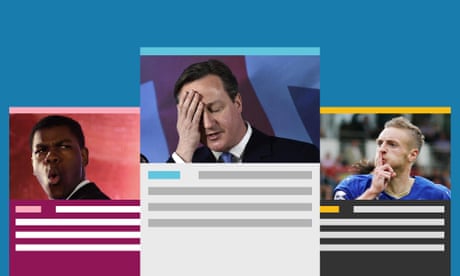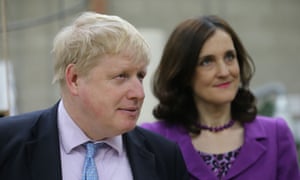The war of words among senior Conservatives over Britain’s relationship with Europe has intensified, as David Cameron’s attempt to make an upbeat case for staying in the European Union – styling himself the leader of “Project Fact” – was dismissed by Boris Johnson as “baloney”.
On the latest stop in his nationwide roadshow to persuade voters to back EU membership in June’s referendum, the prime minister sought on Monday to shrug off the accusation that his central argument to voters has been to highlight the dangers of Brexit – an approach that has been labelled “Project Fear”.
Instead, he sought to make the positive argument for staying in the EU, holding out the prospect of creating a “greater Britain”. He told students in Ipswich: “The only project I’m interested in is Project Fact. Project Fact is about saying: ‘Stay in and you know what you’ll get.’”
He spoke of the benefits of unfettered access to the European single market and argued that Britain had a more powerful influence over global affairs in partnership with other EU countries than it could have alone. “I’m interested in Britain’s ability to bend the world to our way of thinking,” he said.
However, Johnson, the mayor of London, when asked about Project Fact on a visit to Northern Ireland, described it as “baloney”. He insisted instead that the only positive case to be made was for Brexit. “I think there is absolutely nothing to be concerned about, indeed everything to gain,” he said. “We need to lift our eyes to the horizon, we need to think globally.”
FacebookTwitterPinterest Boris Johnson and Northern Ireland secretary Theresa Villiers on Monday. Photograph: Niall Carson/PA
Johnson’s criticisms – he had earlier said that the remain camp was making “a series of questionable assertions” – was just one of a series of hostile interventions on Monday from senior Conservatives, underlining the struggle facing the prime minister in holding the government together in the run-up to the poll and uniting his party afterwards.
Chris Grayling, one of the six cabinet members who favour Brexit, had earlier dismissed a 28-page Cabinet Office report warning of what Cameron called a “decade of uncertainty” if Britain votes to leave, as “completely ludicrous”. Grayling accused his boss of running a “relentless campaign of fear”.
Separately, employment minister Priti Patel, another prominent advocate for Brexit, ramped up the criticism of cabinet secretary Sir Jeremy Heywood’s decision to limit the support civil servants can provide to pro-Brexit ministers, describing it as “unconstitutional”.
In Ipswich, Cameron adopted a conciliatory tone, saying: “I think this has got completely out of proportion.” He insisted the restrictions were reasonable because, “the government isn’t neutral on this: the government has a clear position”.
But later in the day, the Cabinet Office minister Matt Hancock was given a rough ride by Eurosceptic Conservative MPs in the Commons, as he sought to justify the decision; and Heywood was forced to explain his thinking to MPs on the public administration committee.
During an emergency debate, pro-Brexit Tory MPs claimed the Heywood ruling could compromise the civil service’s “duty of honesty”.
Bernard Jenkin, a leading Tory Eurosceptic, led the rebellion with an urgent question to the government, saying the limits went further than those imposed on ministers in 1975 and created a worse atmosphere.
Gerald Howarth, a former defence minister, said it was a “constitutional outrage” and risked giving an impression the referendum was rigged in Cameron’s favour.
The criticisms did not only come from those who are arguing for the UK to leave the EU. A number of Labour MPs raised concerns that the decision will undermine trust in the EU referendum because some will believe there has been an establishment stitch-up. Tom Watson, the deputy Labour leader, said Cameron should let his ministers act freely or sack them.
Asked in Ipswich how cabinet members could possibly work together after the 23 June referendum, Cameron insisted his team had worked well together in the past and could do so again.
Cameron's Project Fact: Brexit to leave us weak, worse off and dead
John Crace

Read more
He also rejected the criticism of the work and pensions secretary, Iain Duncan Smith, at the weekend, that he had a “low opinion of the British people” in doubting the country’s ability to go it alone. “I have the highest opinion of the British people; I am a huge believer in our country, but I think that a greater Britain can be achieved inside the EU,” he said.
But the fresh outbreak of hostilities dashed any hopes of a ceasefire in so-called “blue on blue” attacks between senior Tories.
Lord Mandelson, the former EU trade commissioner, will wade into the row on Tuesday, with a speech arguing that once outside the EU, Britain could face tariffs of up to 10% or more on some of its key exports.
“Losing the EU’s preferential trading benefits in foreign markets could mean new tariffs of 10, 20% or sometimes even more on key UK exports such as cars, machine goods, whisky and textiles,” Mandelson will say, speaking at the Institute of Chartered Accountants in the City of London.
Mandelson, a veteran of fraught trade negotiations at the World Trade Organisation, will argue that it will be harder than leave campaigners appreciate to strike new deals with the world’s major trading powers from outside the EU.
“Our desired negotiating partners have their own priorities and would not necessarily move the UK to the front of the negotiating queue,” he will say.
The Cabinet Office report warned that as well as negotiating the terms of an exit from the EU with the other member states, Britain would also face a formidable challenge in striking new trade deals with non-EU countries such as China, India and the US.

The stories you need to read, in one handy email
Read more
In Ipswich, Cameron urged young people, whom polling suggests are more positive about the benefits of the EU than older voters, to turn out and cast their vote on 23 June in what he called a “massive decision”. “Whatever you think, put that date in your diary,” he said.
The prime minister’s effort to ditch Project Fear came after a call by the Scottish first minister, Nicola Sturgeon, for a “thoroughly positive debate” about the benefits of staying in the EU.
During a speech in Westminster hosted by the Resolution Foundation thinktank, the Scottish National party leader said: “One of the undoubted lessons of the Scottish experience is that a miserable, negative, fear-based campaign saw the no campaign in the Scottish referendum lose over the course of the campaign a 20-point lead.”
Cameron said the government would publish another study later this week setting out the alternatives to EU membership.





No comments:
Post a Comment